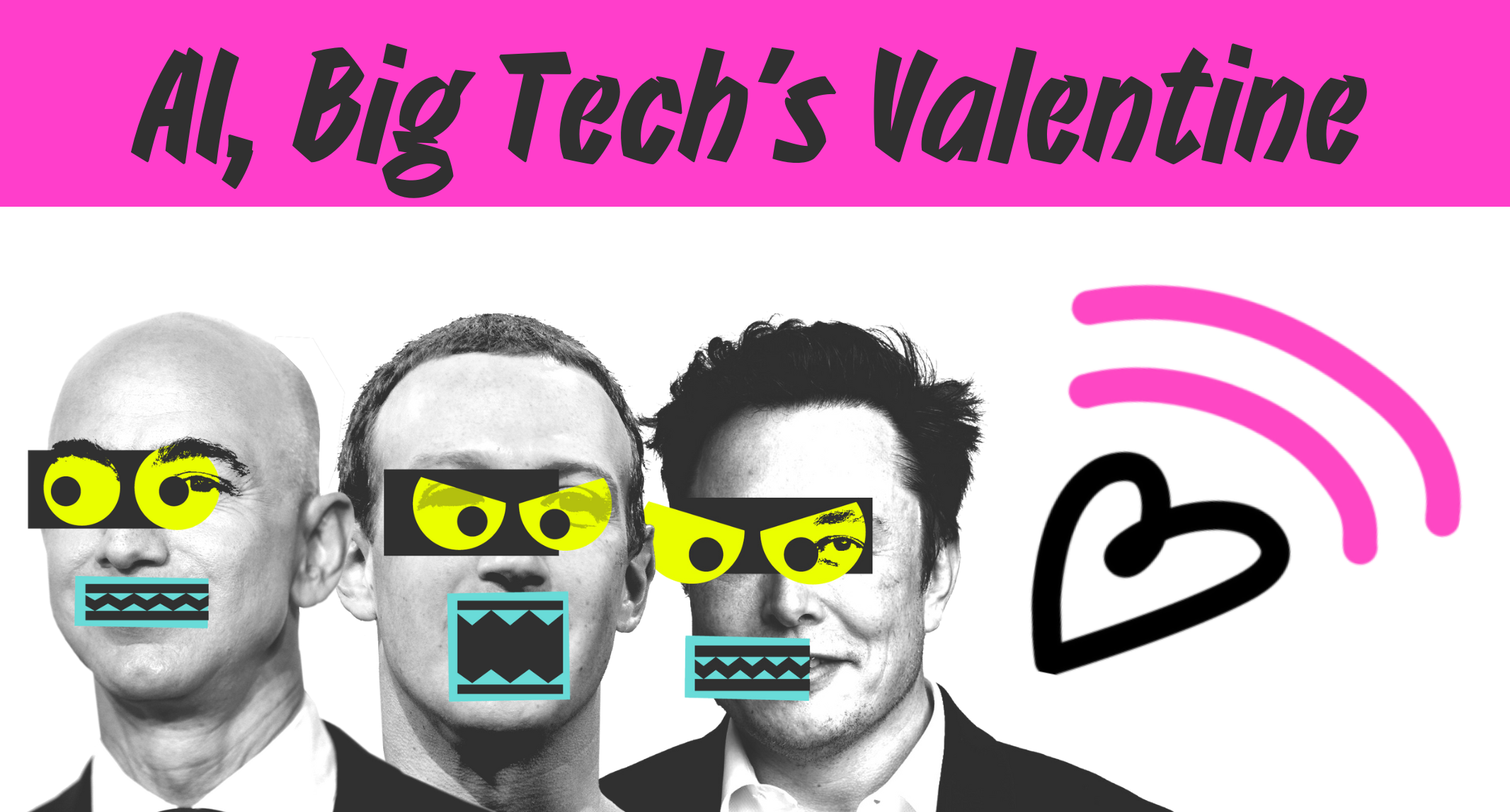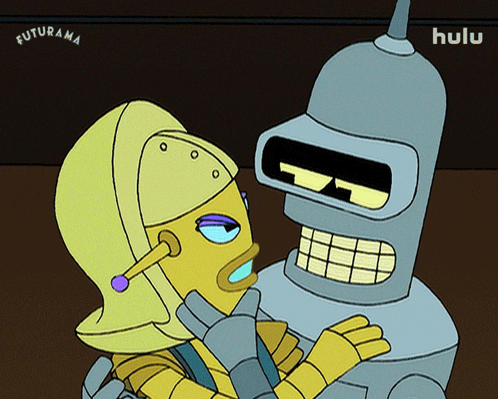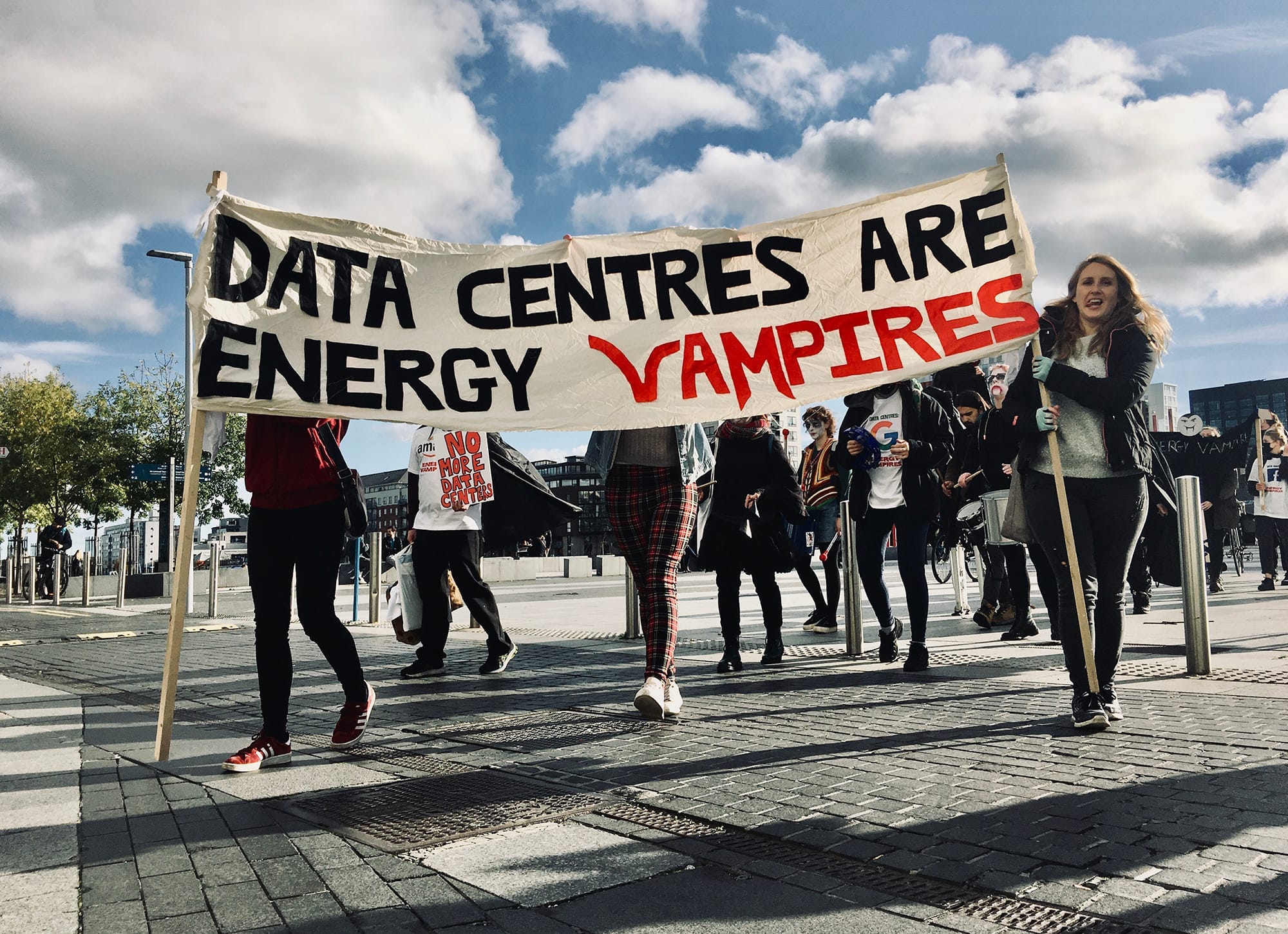AI, Big Tech’s valentine
Global elites want AI to be their valentine – but at what cost? ❤️🔥

What comes into your mind when you think of AI? Perhaps you think of an uncanny political deepfake you've seen, or an impressive AI medical breakthrough you read about?
Or maybe – shout out to my fellow sci-fi nerds – you get carried away imagining AI as a disembodied, faceless machine that’s going to steal our jobs or glitch in dangerous ways that destabilise our societies...
But AI does have a face. Scarier still, it has several faces. Those of our real life overlords, on their ever evil quest for world domination: The Tech Bros.
But like all technologies, AI isn’t ‘good’ or ‘bad’. The issue is the tiny corporate elite behind it.

In a desperate race to become AI’s valentine, heads of state and Tech Bros alike gathered in Paris this week for the AI Action Summit, hosted by French President Macron and Indian PM Modi.
"I have a good friend in other side of ocean [sic], he says drill, baby, drill. Here there is no need to drill, it is plug, baby, plug," joked Macron in a speech on Monday as he boasted about France’s ability to power energy-intensive AI investments using its nuclear power.
Ahead of the Summit, France announced a €109 billion AI investment package, predominantly for new data centres. Separately, the EU has announced a €200 billion investment partly for AI gigafactories.
Guests included US Vice President JD Vance, whose government has just revoked an executive order on AI safety, and European Commission President Ursula von der Leyen, whose colleagues in the EU have gone head to head with Google and Meta over its proposed AI code of practice. Vance left after his speech, not staying to listen to von der Leyen who spoke straight after him...
But don’t worry, it's not too awkward between them: the EU clearly listened to Vance’s criticisms of AI regulation, announcing plans to withdraw its AI liability directive. Cute. The now scrapped rules would have legally protected people in the EU from harms caused by AI systems.
Trump’s trade war and rapid deregulation drive in the US has undoubtedly spooked the EU. And since the US election digital rights activists have expressed concern that the EU will backtrack on enforcing its Digital Services Act and Digital Markets Act – the 2022 laws which led to investigations into X, Meta and Apple – as well as the EU’s AI Act. The UK, meanwhile, is already favouring friendship with Trump over AI safety, walking back on enforcing their manifesto promises on this.
It came as no surprise, then, when the US and UK refused to join the likes of China, India, the EU and the AU in signing the Summit’s declaration calling for ‘inclusive’ and ‘sustainable’ AI.
I’m Alice McCool, human rights and tech justice journalist and editor of this newsletter (subscribe! Now more than ever, we need to stay informed and communicate with each other outside of the Big Tech platforms). This week, I’m exploring Big Tech’s involvement in the AI industry and whether a tech future that protects our rights and our planet is possible.
Big Tech ❤️🔥 AI
It’s no secret that Big Tech wants AI to be its valentine. Amazon, Microsoft, Alphabet (Google) and Meta reported a combined $246 billion investment in AI in 2024, up 63 per cent from the previous year. Amazon alone plans to spend $100 billion on the technology in 2025. And as we’re all too aware, on his continued attempts to be KING OF THE WORLD, Elon Musk is trying to buy ChatGPT owners OpenAI.

All of this isn’t great news, seeing as Big Tech already has a monopoly over so much of the internet – and our lives, on and offline – from social media to maps, dating apps to doorbells.
We’ve been documenting Big Tech’s harms in this newsletter for eight months now, from misogyny to racism, and many of the same issues relate to AI technologies – which is also threatening our creative industries. Not to mention the huge environmental impact of the sector – more on that later.
Big Tech has our data, and in turn the infrastructure and finances to dominate any innovative competitor that emerges. And that’s the way the Trump administration wants to keep it. At the summit in Paris this week, JD Vance said his government “cannot and will not accept” attempts by foreign governments to tighten the screws on US tech companies. He also warned against “overregulation” deterring innovators from taking necessary risks.
But according to Cori Crider, lawyer and senior fellow at Open Markets and FutureTech, history contradicts Vance's claims that regulation stifles innovation.

“Strict application of the law, particularly in terms of competition, triggered technological booms,” wrote Crider in Le Grande Continent this week. She references Bell Labs being forced to make its patents royalty-free in 1956, marking the beginning of the computer age.
She also describes DeepSeek – OpenAI’s faster, cheaper and more energy efficient rival from China – as a direct result of its limited access to high-level microprocessors, blocked by US sanctions. “This progress was driven by the need for this ambitious start-up to cut costs - not by a reckless race to scale,” Crider said.
People vs Big Tech is part of a group of campaigners pushing for public interest AI that puts people first and is open, accountable and transparent – to avoid Big Tech monopolising AI in the same way they have social media, for example. I asked their interim executive director Rasha Abdul-Rahim what she thought about the Summit’s outcomes, and what public interest AI would actually look like:
“As European governments go to great lengths to show they are credible competitors in the race for AI dominance, and within the backdrop of rapid deregulation across the Atlantic, regulation has now become the boogeyman in AI debates. States are scrambling to out-innovate each other, with little thought to guardrails or standards that protect us from the many, documented harms we’ve seen from the use of AI systems. This is a grave mistake.
But one encouraging outcome of the AI Summit was the launch of a fund focusing on the development of purpose-driven AI that prioritises fairness, accountability and global equity - rather than the interests of the dominant tech titans.”
‘Sustainable AI’
The largest tech firms emit 2-3 percent of the world’s carbon emissions - about the same amount as aviation - and the ‘Big Five’ Tech companies consume as much electricity as the population of New Zealand.
This was an issue before the AI boom – from endless advertising to autoplay videos, Big Tech have never cared for environmental efficiency. But now, the industry’s lust for generative AI is resulting in the rapid build out of energy-intensive data centres on a vast scale. Couldn’t they have just sent a valentine's card? 🥺

The Summit statement lists “making AI sustainable for people and the planet” in their priorities. But for Jill McArdle, corporate campaigner at Beyond Fossil Fuels, the answer is simple: AI will never be a climate solution as long as it runs on fossil fuels. She told me:
“Acceleration and deregulation were the messages coming out of the AI Action Summit from governments suffering from ‘AI fomo’ and desperate to prove that they are 'open for business'. While lip service was paid to sustainability, major announcements on AI infrastructure investments showed where the real political intentions lay. This was all music to the ears of Big Tech who are ploughing ahead with their resource-intensive expansion plans.”
New research shows that the energy needs of data centres in Europe could grow by 160% by 2030, undermining climate goals. And yet, the announcements of large scale AI investments by global elites just come keep on coming – and they don't feel very sustainable…
EDRi Policy Advisor Blue Tiyavorabun told me the Summit “traded empty promises for the severe environmental impact of AI systems,” and saw the "abandoning of European principles and falling into step with the Trump administration.”
A powerful statement by the Green Screen Coalition signed by over 130 civil society groups earlier this month states that a paradigm shift is urgently needed to “bring AI systems in line with planetary boundaries” instead of viewing technological progress as “inherently beneficial or limitless.”
It also calls for AI processes that contribute meaningfully to society to be prioritised, while minimising environmental and human harm. Which we all know Big Tech just loves to do.
Actions you can take ✊
👾 Support the Free Our Feeds campaign, a movement working to prevent any single billionaire from controlling all our social media platforms.
👾 Are you an artist worried about the impact of AI on your work? Check out ‘data poisoning’ tool Nightshade, created at the University of Chicago, which alters images in ways that the human eye can barely detect, but which severely skews the picture when ingested by AI.
👾 Sign up here to make sure The People gets delivered straight into your inbox for free. We work with journalists, campaigners, and experts to bring you the Big Tech stories they don’t want you to know about, AND we won’t spam you or steal your data.

